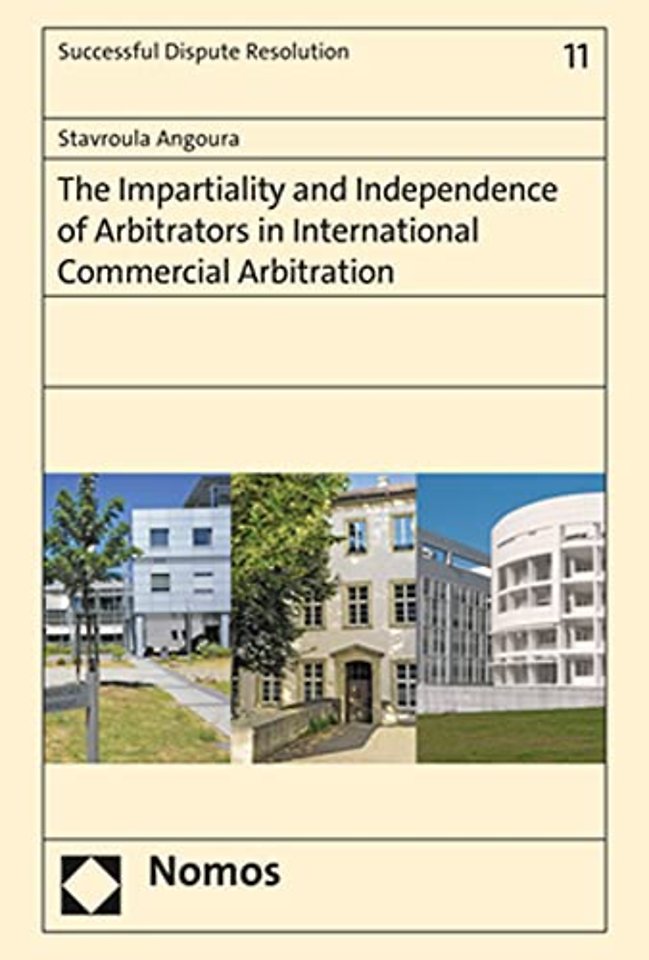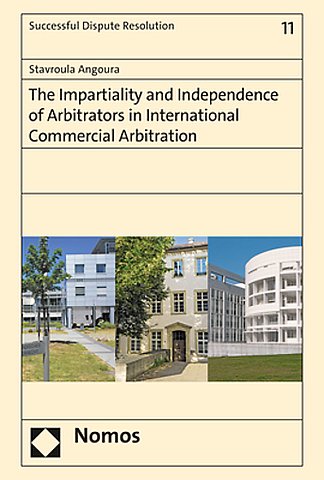The Impartiality and Independence of Arbitrators in International Commercial Arbitration
Samenvatting
Die Unabhängigkeit von Schiedsrichtern ist für die internationale Schiedsgerichtsbarkeit von grundsätzlicher Bedeutung. In der letzten Zeit wurden immer häufiger Schiedssprüche wegen mangelnder schiedsrichterlicher Unabhängigkeit aufgehoben.
Das vorliegende Werk ist dem praxisrelevanten Fragenkomplex der schiedsrichterlichen Unabhängigkeit und Unparteilichkeit gewidmet. Eingehend werden die ausgefeilten dogmatischen Strukturen und die relevante Rechtsprechung der für die internationale Schiedsgerichtsbarkeit wichtigen Rechtsordnungen (Frankreich, England, Schweiz, Deutschland) auf der pro-arbitralen, arbitralen und post-arbitralen Verfahrensebene untersucht. Ein detailliertes Stichwortverzeichnis und eine umfangreiche Literaturliste runden die Arbeit ab.
Aus dem Vorwort:
'Dr. Angoura’s book provides a detailed, systematic and comprehensive analysis of the concepts of independence and impartiality of arbitrators in international commercial arbitration. In addition to exploring the arbitrator’s duties of impartiality and independence on a conceptual and theoretical level, provides a valuable tool for practice in international arbitration. Its careful examination of national court decisions, institutional rulings and other authorities is an important contribution to parties, lawyers, arbitrators, institutions and national courts to facilitate decisions on questions of disclosure and waiver and its application to impartiality at the different arbitration stages. This book contributes in particular to the ongoing discussion of the arbitrator’s impartiality as one of the (most frequently-invoked) grounds for annulment or non-recognition of arbitral awards. I congratulate the author for her very thorough research and thoughtful writing and her valuable contribution to the dialogue between academia and practice.' - Gary B. Born, London, November 2021
Specificaties
Inhoudsopgave
Introduction§ 1. 23
Research Question I. 23
Methodology II. 27
Structure III. 29
Legal foundations, definition and interpretation of the concepts of arbitrator impartiality and independence § 2. 31 Foundations I. 31
1. The fair trial principle 38
2. National arbitration laws 42
3. Institutional rules 45
The IBA Guidelines on Conflicts of Interest in International Arbitration as interpretation aid II. 46
Concepts of arbitrator impartiality and independence III. 53
1. The concept of impartiality 53
2. The concept of independence 55
3. Impartiality applied to arbitrators 60
The question of ‘justifiable doubts’IV. 65
Instances of arbitrator’s lack of impartiality§ 3. 68
General remarksI. 68
Arbitrator’s relationship with the disputeII. 69
1. Significant direct or indirect financial interest in the dispute 70
2. Personal interest in the dispute 71
3. Prior involvement in the dispute 71
4. Arbitrator’s appointment in a related matter 72
5. Publicly expressed legal opinion 76
Arbitrator’s relationship with one of the parties or counsel III. 77
1. General remarks 77
2. Arbitrator’s professional relationship with one of the parties 79
a) Arbitrator’s employment by one of the parties 79
Arbitrator acting as manager, director or member of the supervisory board of one of the parties b) 80
Arbitrator’s business or financial relationship with one of the parties 3. 81
a) Direct relationship 81
b) Indirect relationship 82
c) Prior business or financial relationship 84
d) ‘Repeat arbitrator’ 85
Arbitrator’s family or personal relationship or any other nontrivial ex parte contact with one of the parties (or its counsel) 4. 90
a) Close family relationship 90
b) Close personal relationship 92
c) Remote and insignificant social relationship 93
d) Ex parte contacts 94
Common nationality of presiding arbitrator with one of the parties 5. 99
6. Arbitrator representing one of the parties 100
Arbitrator’s relationship with counsel representing one of the parties 7. 103
Arbitrator’s relationship with another arbitrator, witness or arbitral secretary IV. 112
Arbitrator’s law firm relationship with one of the parties or counsel V. 115
Arbitrator’s conduct and expressions of opinion during arbitration VI. 118
Controlling lack of impartiality before and after rendering award § 4. 121
Arbitrator’s duty of disclosureI. 121
1. Nature of the duty of disclosure 124
2. Timing of the duty of disclosure 126
3. Arbitrator’s investigation duty 127
4. Scope of the duty of disclosure 130
a) The applicable law to arbitrator’s disclosure duty 131
The subjective and objective standards of the duty of disclosure b) 133
The interface between parties’ investigation duty and arbitrator’s disclosure duty c) 138
5. Consequences of breach of the duty of disclosure 149
Challenge of the arbitrator during arbitration proceedings on grounds of lack of impartiality II. 156
The interplay between the principle of party autonomy and fair trial 1. 157
2. Challenge procedure and time limit 159
Subsidiary competence of the judge at the seat of the arbitral tribunal 3. 160
Legal remedies against the decision on the challenge of the arbitrator 4. 162
5. The objective standard of the disqualification of an arbitrator 166
Annulment of an arbitral award or non-recognition and non-enforcement of a foreign arbitral award on grounds of arbitrator’s lack of impartiality III. 167
Grounds for annulment of an arbitral award, non-recognition or non-enforcement of a foreign arbitral award based on arbitrator’s lack of impartiality 1. 168
a) The violation of due process 169
The irregular composition of the arbitral tribunal or violation of parties’ agreed arbitral proceedings b) 171
c) The violation of public policy 176
2. Effect of bias on the arbitral award 179
The institution of waiver§ 5. 183
The object of waiver: the right to an impartial tribunal versus the right to contest arbitrator’s lack of impartiality I. 183
The mechanism of waiver as an aspect of good faithII. 187
Preconditions of implicit waiverIII. 189 Knowledge of facts or circumstances giving rise to arbitrator’s lack of impartiality 1. 189
Failure to object to arbitrator’s lack of impartiality within set
time limit 2. 195
a) The specification and compliance with the set time limit 195
The preclusive effect of waiver of the right to contest arbitrator’s lack of impartiality at different stages b) 199
Advance waiverIV. 204
Conclusions§ 6. 212
BIBLIOGRAPHY 219
LIST OF CASES 251
Biography 265
Index 267
Anderen die dit boek kochten, kochten ook
Net verschenen
Rubrieken
- aanbestedingsrecht
- aansprakelijkheids- en verzekeringsrecht
- accountancy
- algemeen juridisch
- arbeidsrecht
- bank- en effectenrecht
- bestuursrecht
- bouwrecht
- burgerlijk recht en procesrecht
- europees-internationaal recht
- fiscaal recht
- gezondheidsrecht
- insolventierecht
- intellectuele eigendom en ict-recht
- management
- mens en maatschappij
- milieu- en omgevingsrecht
- notarieel recht
- ondernemingsrecht
- pensioenrecht
- personen- en familierecht
- sociale zekerheidsrecht
- staatsrecht
- strafrecht en criminologie
- vastgoed- en huurrecht
- vreemdelingenrecht








